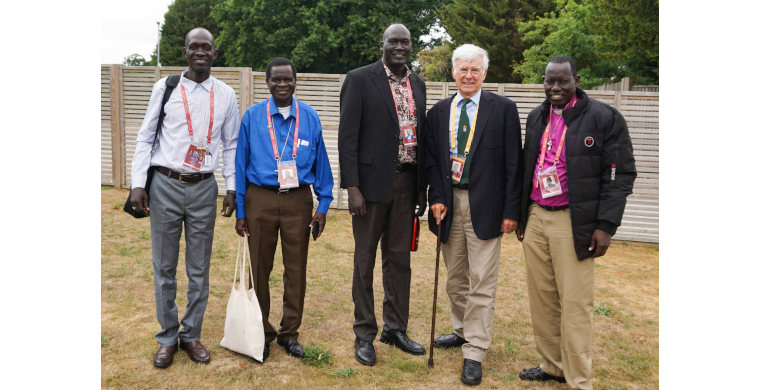South Sudanese Bishops Would Rather Go Without Than Compromise Their Faith Over Homosexuality
By David W. Virtue in Canterbury
www.virtueonline.org
August 4, 2022
Since 2008, The Episcopal Church of South Sudan has steadfastly refused to take funds from the Episcopal Church, allowing them the freedom to speak freely at the Lambeth Conference, maintaining biblical faithfulness on sexuality issues.
Other bishops from the Global South have hinted that they do not want to put at risk financial help to their diocese from "revisionist" dioceses and provinces like TEC.
The Archbishop of South Sudan, Justin Badi, has had a high profile at the Lambeth Conference. Badi is waging a holy war alongside one other Archbishop, James Wong of the Indian Ocean. Badi is taking a fearless stand for the gospel on this issue.
Four of his bishops spoke movingly to Virtueonline about the situation of their people in their dioceses who face starvation and poverty in order to maintain their integrity.
Bishop Moses Deng of Northern Bahr-el-Ghazal explained that South Sudan has been in a state of 'war' since 1955. But even now, many rebel groups have not signed the Revitalised Peace Agreement which runs out in February 2023.
They face an economic crisis: teachers, policemen, civil servants and even the army have not received their salary for 4-6 months, of 6600 South Sudanese pounds (10 dollars) per month. 98% of South Sudan's income is from oil and all of that has been sold up until 2027.
Most food has to be imported from Uganda and Kenya. Ongoing insecurity from inter-tribal conflicts, rebel groups, and unknown criminals with guns means that the South Sudan has not been tilled. Therefore, food must be paid for in foreign exchange. But the banks have no dollars.
Due to lack of food, some have fled to Uganda and Congo, two days' trek away.
There, Bishop Semi, himself a refugee, ministers to his people from the far south of Southern Sudan in the refugee camps. There they have built churches under the trees. But they lack bibles he told VOL. They have, however, started agricultural work by hiring land in Uganda to till. Anglican International Development (AID) has assisted them to get started.
To encourage his people, Bishop Levi of Yei has held Bible training conferences for his pastors, families and young people. His diocese has the protection of a UN battalion, but unpaid South Sudanese troops have not been paid and those troops have looted villages for food.
Bishop Jackson of Juba spoke of Microfinance projects which help poor women, who use the income they got to support their families. The bishop sees this as a way of evangelism as they see this provision as from the hand of God. Once one group of women is stabilized, Microfinance moves on to another.
Bishop Deng said that in his area in the north, the majority of people doing business are Muslims and those driven by poverty are helpless before them. He fully expects the Muslim influence to increase in the future.
Out of this context, the Episcopal Church of South Sudan has refused to take funds from the Episcopal Church of the USA.
CEN contributed to this story.














